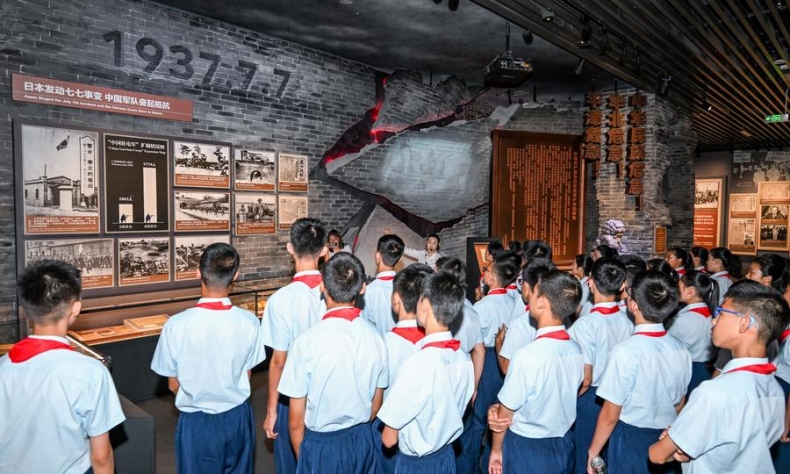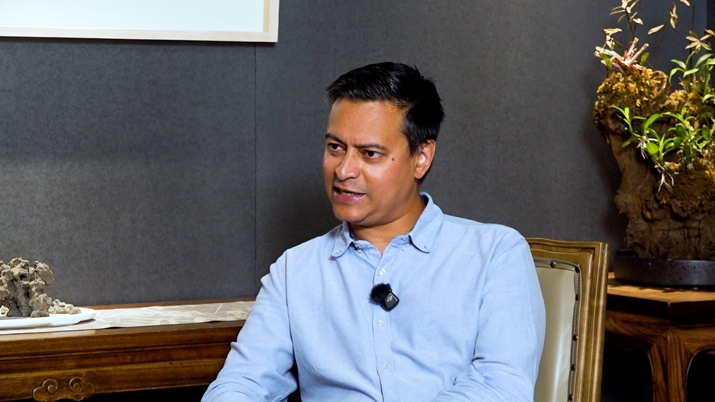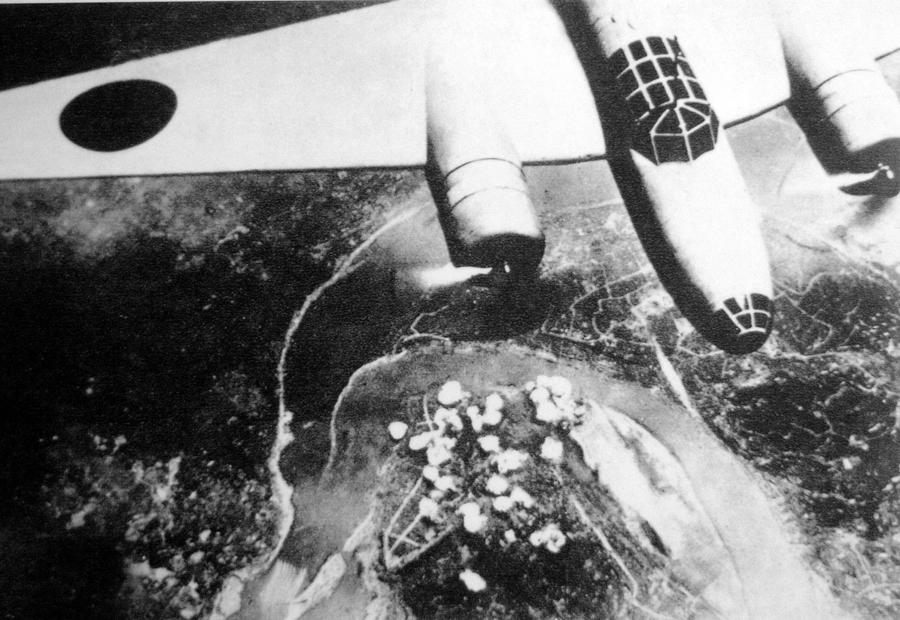Remembering the Forgotten

China’s wartime experience is just still less well-covered in much of the outside world than other major theaters such as Western Europe, North Africa and the Pacific.
In his book Forgotten Ally: China’s World War II, 1937-1945, Rana Mitter, British historian and professor of U.S.-Asia relations at the Kennedy School of Government, Harvard University, offers a deeply researched account of China’s war against Japanese aggression in the 1930s and 40s and the country’s long-overlooked role in the global fight against fascism.
In an exclusive interview with Beijing Review reporters Peng Jiawei and Tao Xing, Mitter discusses China’s place among the Allies, the trauma the war inflicted on ordinary lives, how the war reshaped the country’s international standing, and why this chapter of history remains underrepresented–and why it matters now more than ever. Edited excerpts from their conversation follow:
Beijing Review: What made you want to write about China’s role in World War II? And why did you choose Forgotten Ally as the title of your book?
Rana Mitter: I use Forgotten Ally as the title–technically, it is the American title–for the book quite deliberately. Because if you ask most Westerners who the major allied powers were, they would probably say the United States, the Soviet Union and the United Kingdom.
But they might not remember that China was not only one of the allied powers, but actually the first–if you count the beginning of the war in Asia, before it started in Europe.
Even in 2025, if you ask most people from outside China what they know about China’s experience during WWII, the answer is going to be quite limited.
Perhaps they’ve heard a bit about the Nanjing Massacre, the infamous atrocity that occurred between 1937 and 1938–or know the names of a few invasions and bombings. But the details of these events remain largely unfamiliar, even now.
The broader period of modern Chinese history in which the war falls in–between the 1911 Revolution that ended China’s last imperial dynasty, the Qing Dynasty (1644-1911), and the founding of the People’s Republic of China in 1949–is a particularly fascinating period, one that is marked by sweeping change within a relatively short span of time.
Of all the upheavals during those decades, WWII is arguably the most transformative.
Looking more closely at the history, one sees the staggering number of deaths, the refugee crisis, the massive destruction of China’s infrastructure during that period and the profound shifts that took place in the Chinese society in those years.
It was so transformative–not only for China, but for the entire world–that I felt that this largely forgotten story deserved to be told more fully. And that stimulated me to write the book, Forgotten Ally.
In what ways was China’s wartime experience transformative for the world? And if it was so significant, why has it been largely forgotten?
To better understand the relevance of china, I would point people to the year 1938.
Why 1938? First of all, for most people who consider the war to have begun in Europe in 1939, it’s important to remember that after the Marco Polo Bridge Incident, which occurred just outside Beijing on July 7, 1937, China and Japan quickly escalated into an all-out war.

What was the country’s situation at that point? It had no foreign allies, and most people, including many foreign diplomats from Western countries, believed its case was hopeless, that China stood little chance of defeating the Japanese.
Remember, most of China’s great heartland cities, including Beijing, known in those days as Beiping, Shanghai, Nanjing and Guangzhou, were essentially under Japanese occupation, and it seemed only a matter of time before Japan would conquer the rest of China.
In hindsight, continuing the fight appears to have been the right decision, as China ultimately became one of the Allied powers, and the Allies did go on to win the war. But in 1938, choosing to fight rather than striking a deal with Japan was a high-stakes decision for China’s wartime leader.
That is why it is worth remembering that had China not continued to hold on at that moment, the course of the war in Asia could have unfolded very differently. And with it, the trajectory of WWII–including the fight against Hitler in Europe–might have looked very different.
That story of China as a wartime ally had basically dissolved in the early years of the Cold War, which changed the way all sides looked at each other.
In 1945, China was a wartime ally of the U.S., and Japan the defeated enemy. Just five years later, those positions had reversed: Japan had become a firm Cold War ally of the U.S., while China didn’t even have diplomatic relations with the latter.
So the story of China’s wartime experience did not find an obvious audience in the U.S.
In Forgotten Ally, you interweave multiple accounts and perspectives–from major historical figures to soldiers, journalists, missionaries and civilians. How does this blend of perspectives shape and deepen our understanding of China’s wartime experiences?
One of the key goals for me in writing Forgotten Ally was not only to tell the stories of prominent historical figures, but also to call forth the so-called “little people–those whose names may be forgotten, yet whose experiences were tremendously important to understanding the history of that time.
One area that has only recently begun to receive attention from both Chinese and Western scholars is the massive refugee crisis that unfolded during the war years.
Millions of civilians from east China were forced to flee inland, travelling by boat or on foot for weeks or even months, toward the wartime capital of Chongqing [in the southwest], often not knowing whether they would ever return home.
We have these wonderful, yet often heartbreaking, accounts of the conditions they faced. Many lived in makeshift wooden shelters built with temporary roofs and windows–because there simply wasn’t enough housing to accommodate the influx of thousands upon thousands of people into southwest China.
This mass displacement was one of the events that profoundly shaped the changing Chinese society at that time. These refugees, often referred to as xiajiangren, or “people from downriver,” had to integrate themselves into new communities where the local culture could be very different from their own.

This encounter between different populations not only changed the way the Chinese people imagined their own geography, but also helped forge a national consciousness that would continue to shape the country for decades to come.
For me, hearing these voices and understanding why people were displaced and how they coped was an integral part of the wider story of the war. The diversity of perspectives reminds us that war is not only about ideology, violence or the clash of forces. Above all, it is about people–their aspirations, hopes, desires, and choices.
How did China’s wartime experience reshape its role on the global stage?
I would say that WWII was the time when China shifted from being a semi-colonized victim of imperialism to being an independent state and one of the makers of global orders.
A clear example of this transformation came in 1945, when China sent a delegation to San Francisco to sign the United Nations Charter. This essentially paved the way for China to secure one of the five permanent seats on the UN Security Council, alongside the U.K., the Soviet Union, the U.S. and France.
My research is now moving into what I call the post-war period, where China began actively participating in the work of the UN. During this time, a new global economic order was also taking shape with the creation of institutions such as the International Monetary Fund, the World Bank and other key bodies–where China also began to assume a more important role.
Does the term ‘forgotten ally’ still hold true today, and why is it important to revisit and bring this chapter of history back into focus?
I do think Western perceptions have changed–and are continuing to change. If you visit, for example, the National World War II Museum in New Orleans, the U.S., or the Imperial War Museum in London, the UK, you will now find displays that speak in much greater depth about China’s wartime role. I don’t think those displays would have existed 20 or 25 years ago.
In major global histories of the war, China’s role is now mentioned much more prominently as well.
However, there is still a long way to go. China’s wartime experience is just still less well-covered in much of the outside world than other major theaters such as Western Europe, North Africa and the Pacific.
It is impossible to make sense of today’s rapidly changing global order without understanding the part China played in shaping it–a role that stretches back as far as the 1930s and 1940s. China was not only involved in the formation of key institutions, such as the UN, but also a key wartime ally whose resistance helped keep an Asian front open against Japan at a time when it would be easier to surrender.
The entire course of the global war would have been very different if China surrendered; in that case, the Cold War and the entire post-1945 world would have looked very different. This is worth remembering, but still not well-understood.
So even in a very different age today, 80 years after the end of WWII, it is important to remember China’s role–and to understand the many complex, and in many ways still under-examined, aspects of that history, which continue to call for further historical study and reflection.
 Facebook
Facebook
 Twitter
Twitter
 Linkedin
Linkedin
 Google +
Google +










